Mar
25
2010
or Jesus in the Synagogue of Satan
I am jealous for you with godly jealousy. For I have betrothed you to one husband, that I may present you as a chaste virgin to Christ. But I fear, lest somehow, as the serpent deceived Eve by his craftiness, so your minds may be corrupted from the simplicity that is in Christ. For if he who comes preaches another Jesus whom we have not preached, or if you receive a different spirit which you have not received, or a different gospel which you have not accepted — you may well put up with it! (2 Corinthians 11:2-4)
Read Fighting Over the Children and The Finger of God before you read this post.
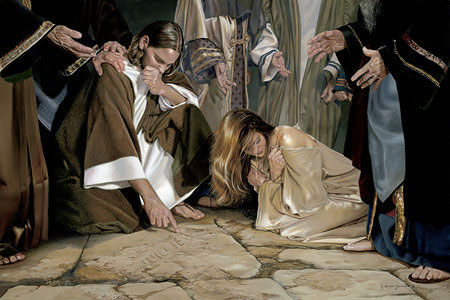
John’s account concerning the woman caught in adultery highlights the satanic nature of legalism. The garden of Eden is not replayed here; rather, it is a sequel.
You must be logged in to see the rest of this post.
Join now for a year for $15!
The woman stands in the midst (a phrase that occurs twice). She is the Altar of Incense, the fragrant “army.” The scribes and Pharisees are the false Lampstand, standing in for satan as his body. He is, after all, their father. They bring no male lover to be condemned. She has been enticed and now stands accused. Her sin is one of wandering astray. Their sin is high-handed.
Continue reading
Comments Off | tags: Feasts, Genesis, John, Lampstand, Satan, Worship | posted in Biblical Theology
Mar
18
2010
Memorials are a big deal in the Bible. When the Lord sees a covering—a firmament—whether it be a rainbow, or blood displayed, He remembers.
When Jesus asks His disciples to perform the Lord’s supper as a memorial to Him, it is not for our memory but God’s. He sees the bread and wine, remembers the blood of His son, and we are spared, covered.
Continue reading
Comments Off | tags: Baptism, Crucifixion, Feasts, Luke, Memorial, Tabernacle | posted in Biblical Theology
Mar
16
2010
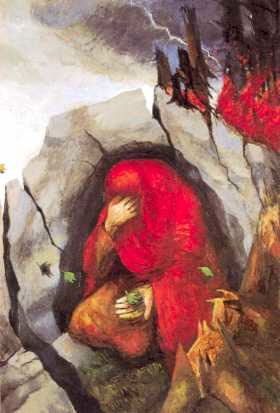
or Sinai Unspoken
On Mount Carmel, Elijah had built an altar of 12 rough-hewn stones. They substituted for the tribes of Israel. They were built and then consumed. The priests of Baal were slain and “washed” in the brook as atonement. The Land was clean. But we know Jezebel trampled this sacrifice underfoot. [1]
Elijah headed for the wilderness. He was a man with a mission. He went to the same cave in which Moses stood, a cleft in the rock. Once again, the Lord “passed over.” He was making a new Covenant, a new Creation, a new Heavens and a new Land.
Continue reading
Comments Off | tags: Azal, Cain, Elijah, Elisha, Ezekiel, Feasts, Hebrew, Jezebel, Tabernacle | posted in Biblical Theology, The Restoration Era
Mar
8
2010

“God’s Cloud over the people forms a Great Booth, within which they live. That Cloud over them is like the glorious canopy of a leafy tree, and thus the reproduction of such an arboreal canopy is a symbol of God’s Cloud.”
An important thread of God’s methodology is His process of bringing us from slavery to Sabbath, from childhood to maturity. It begins with Creation and ends with Glorification.
The Lord speaks the Word from His glory cloud—like the Light created on Day 1—and a stagnant history begins to move forward once again. At the end of the process the Lord returns in His cloud, but it is now made of something even better. The Lord’s robe is no longer a covering of Angels but a covering of redeemed, glorified Men.
In the Tabernacle, the housebuilding process begins with the Ark as “Light” and ends with God’s Cloud—the Shekinah—resting upon it. In the Feasts, it begins with the regular Sabbath as the Creation week and ends with the Feast of Tabernacles, the greater rest. Continue reading
Comments Off | tags: Feasts, James Jordan, Tabernacles | posted in Biblical Theology
Feb
22
2010
or Show Me the Tropes

Literary agent Peter Rubie would undoubtedly have read many story synopses, both fiction and non-fiction. His colleague Janet Reid advises that anyone wishing to write a bestseller should read at least two thousand novels before attempting to write their own. Peter gives some helpful advice:
Continue reading
Comments Off | tags: C. S. Lewis, Culture, Feasts, Joke, Literary Structure | posted in Biblical Theology
Jan
28
2010

36. Acording to Preterists, all those left in Jerusalem were reckoned unholy. But see Isaiah 4:3-4.
Simple answer: Isaiah 4 refers to the “new Jerusalem” of Ezra and Nehemiah. But I’m going to use this as an opportunity to analyse Isaiah 4 and its context. This stuff blows me away.
Continue reading
Comments Off | tags: Bible Matrix, Ezra, Feasts, Isaiah, Jeremiah, Literary Structure, Nehemiah | posted in Against Hyperpreterism, Biblical Theology, The Last Days, The Restoration Era
Jan
26
2010
31. The remnant of Israel still practices iniquity (Zeph. 3: 13).
Drew was right. Some of these really are weak. Zephaniah denounces Judah for her indulgence in idolatry and luxury while she presumed the Lord would protect her. He predicts a new Jerusalem without these sins. All fulfilled. Ripping the prophets out of context and applying them to modern “Jews” is not only infantile exegesis, it removes most of the Bible from the real world so it can apply to some future Jews. God doesn’t work that way. He warns, waits a generation, then judges. Always. Same thing goes for the Revelation.
Continue reading
Comments Off | tags: AD70, Feasts, Literary Structure, Zechariah | posted in Biblical Theology, The Last Days
Jan
22
2010
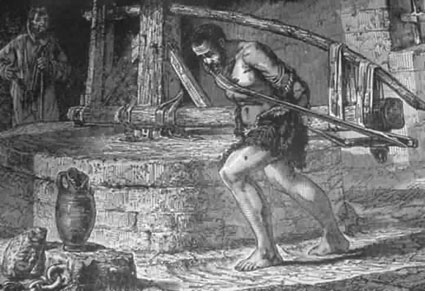
26. Christ returned in A.D. 70 (?), but according to preterists the literal cloud was missing (see Acts 1: 9; Matt. 24: 30; Rev. 1: 7).
The “Bible matrix” pattern always begins with a Word from God’s glory cloud on the Lord’s Day (Sabbath), the accepted Mediator received into this single-cloud “Tabernacle” (Firstfruits) and ends with multiple clouds, a corporate Mediator (the body). The Feast of Tabernacles (“succoth”) is literally the Feast of Clouds. This was fulfilled in AD70. Christ ascended to prepare the place, and the firstfruits church was received into it at the destruction of the Temple.
See also Not Just Any Old Cloud.
Continue reading
Comments Off | tags: Feasts, Glory cloud, Isaac, Jacob, Judaisers, Samson | posted in Biblical Theology, The Last Days
Jan
8
2010
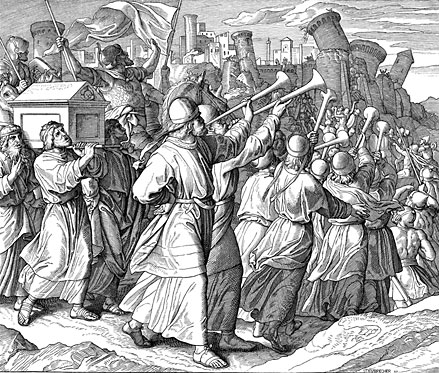
[Link to parts 1 and 2.]
In Revelation 4-5, Jesus ascends and opens the New Covenant scroll (Firstfruits). As Moses, He then opens the Law to Israel (Pentecost). These open seals lead into the partial judgments of the Trumpets. They summon a new generation of Israel and warn the old. The last trumpet, as in Joshua, is itself “seven thunders” (John’s “Little Book”) that bring total destruction to the defiant city, in this case, Herod’s Babylon (Atonement). This is the last trumpet Paul referred to.[1]
Continue reading
Comments Off | tags: Elijah, Feasts, James Jordan, Moses, Peter Leithart, Revelation | posted in Biblical Theology, The Last Days
Jan
7
2010
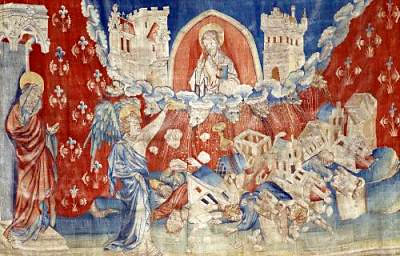
Revelation can’t be fully appreciated without attention to its literary structure. I’m no expert, but have a gander at this…
Continue reading
4 comments | tags: AD70, Atonement, David Chilton, Feasts, James Jordan, Literary Structure, Pentecost, Revelation | posted in Biblical Theology, The Last Days, Totus Christus

































